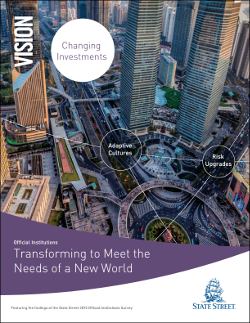Ungated Post | 08 Apr 2016
Official Institutions: Transforming to Meet the Needs of a New World

In an economic environment marked by uncertainty, a leading group of official institutions is responding by developing agile, flexible operating models.
Oxford Economics surveyed representatives from 102 official institutions in September and October 2015. Of these, 52 were central banks, 25 were sovereign wealth funds, and 25 were government pension funds. Respondents covered a range of roles with strategic oversight of their institutions’ investment strategies, including fund managers, portfolio managers, CFOs and strategy directors.
Those surveyed were asked for their views on the investment environment, and answered a series of questions regarding changes they had made—and plan to make—to their operations over the next three years.
Oxford Economics’ team is expert at applying advanced economic tools that provide valuable insights into today’s most pressing business, financial, and policy issues.
To find out more about our capabilities, contact:
Americas
Diantha Redd
+1 (646) 503 3052
Email
Asia Pacific
Peter Suomi
+65 6850 0110
Email
EMEA
Aoife Pearson
+44 (0)203 910 8054
Email
Related Services

Post
The economic impact of abandoning the WTO
Oxford Economics have been commissioned by the International Chamber of Commerce (ICC) to provide an independent assessment of the economic impact of WTO dissolution. This report details our findings and the assumptions underpinning our analysis.
Find Out More
Post
The economic impact of the sports activities of public service media
This study shows how the sports activities of public service media supported €4.5 billion of GDP and 57,000 jobs across 31 European countries in 2022. The report also highlights wider economic benefits of public service media sports coverage, such as the way in which it leverages sponsorship income for sports bodies.
Find Out More
Post
Global Trade Education: The role of private philanthropy
Global trade can amplify economic development and poverty alleviation. Capable leaders are required to put in place enabling conditions for trade, but currently these skills are underprovided in developing countries. For philanthropists, investing in trade leadership talent through graduate-level scholarships is an opportunity to make meaningful contributions that can multiply and sustain global economic development.
Find Out More